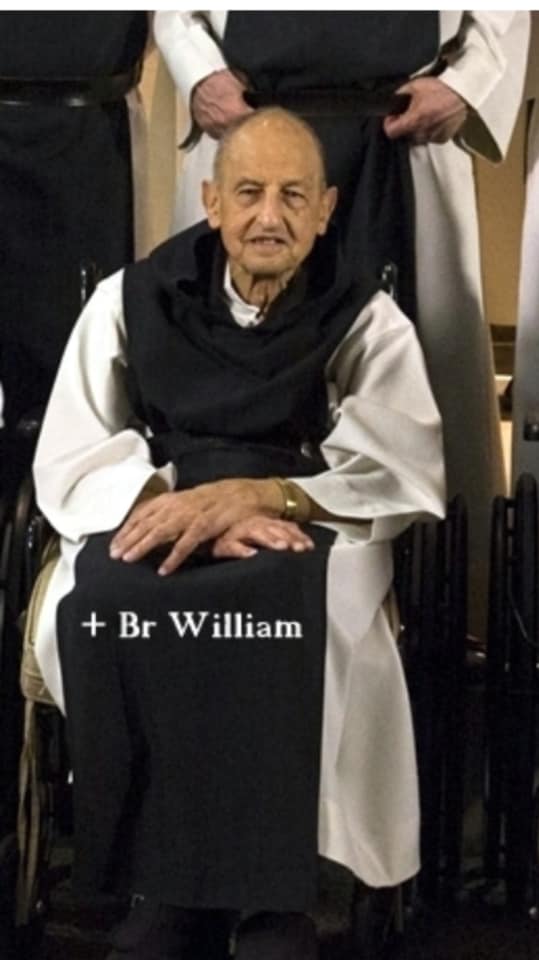Homily for funeral of Br. William Leone by Abbot Elias

ABBOT ELIAS DIETZ, O.C.S.O.
Homily for Funeral Mass of Br. William Leone, OCSO December 18, 2018
[Is 25:6a, 7-9: 1 Jn 3:1-2: Mt 11;11-15]
The Violent Bear It Away
Although it is not a usual choice for funerals, this gospel from Matthew keeps us in the Advent mode. And, since it is an extremely enigmatic passage, it also keeps us in the “William” mode.
As an older translation has it, Jesus says; “From the days of John the Baptist until now, the kingdom of heaven suffers violence, and the violent bear it away.”
One of the more common interpretations of these words is that there is a sort of holy violence by which some people attain the kingdom of heaven at the cost of hard renunciations. There are many callings in the Church, and, although this one may sound off-putting, it nevertheless deserves respect when it is authentic.
I associate Br. William with this passage, because I always perceived a kind of violence in his fundamental choices. It seems that early on—perhaps even before he entered the monastery—he settled on a rather extreme understanding of religious life and stayed with it. It implied a radical renunciation of self that sometimes came out in odd ways. His stubborn independence was the flip side of his desire not to matter and not to be noticed. It is as if time stopped for him when he became a monk. He showed little interest in current events and did not seem to take into account that people and communities change over time. To the day he died he seemed surprised that he could not do what he did fifty years ago. He did not willingly talk about himself or volunteer memories of the past. Most of us maintain interpersonal connections through shared memories, which we are constantly reinforcing by telling stories and recalling past events. Br. William pretty much opted out of that part of life, with the result that many of us experienced him as unknowable.
Somehow, directly or indirectly, he picked up on some very old monastic advice and ran with it. Here are some of those recommendations from the Mirror of Monks, an anonymous little work now 800 years old;
[The monk] should not accept any kind of gift from anyone. Let him have no one as his intimate friend. In everything he should flee whatever marks him off as exceptional or worthy of admiration. When he speaks let him say nothing that would lead people to think of him as very learned or very religious. […] Let him remember that God is present to him in his every action or thought. And let him regard as squandered every moment when he did not think of him. The monk should be like Melchizedek; without father, without mother, without ancestry. He should call no one upon earth his father. Rather, he should think of himself such that it is as if he and God alone exist. (CSQ 45 [2010]; 439-440)
Eight centuries later, in a day when health, wellness, and connectedness are among our top values, these may seem like questionable spiritual choices. The gospel we just heard can help us suspend that judgement and see in those choices a sort of violence for the sake of the kingdom. And in William’s case, the proof of authenticity would be in the obvious and more attractive virtues we all saw in him; a generally sweet and obliging disposition, unwavering dedication to prayer, and a love of quiet, unnoticed service.
Jesus’ enigmatic words about the violent bearing away the kingdom invite us to shift our perspective and perhaps even invert our point of view. In the very experience of being nonplused by William, we actually knew him perfectly well; that is who he was. And, whether the kingdom is obtained by patience or taken by force, everyone who perseveres in his or her unique vocation is a sign of hope that the kingdom is there, on the horizon. After all, the sweet and abiding mysteries of Advent and Christmas carry within them the seeds of the violence, suffering, and glory of Holy Week and Easter.
So, we bury our Br. William with gratitude for the shared opportunity the Lord gives us to keep moving toward his kingdom on the unique path marked out for each of us.
And, lastly, we might have some thought for the unfortunate angel, whose duty it will be to explain to William that it is now time to relax and enjoy eternity!
~~~~~~~~~~~~~~~~~~~~~~~~~~~~~